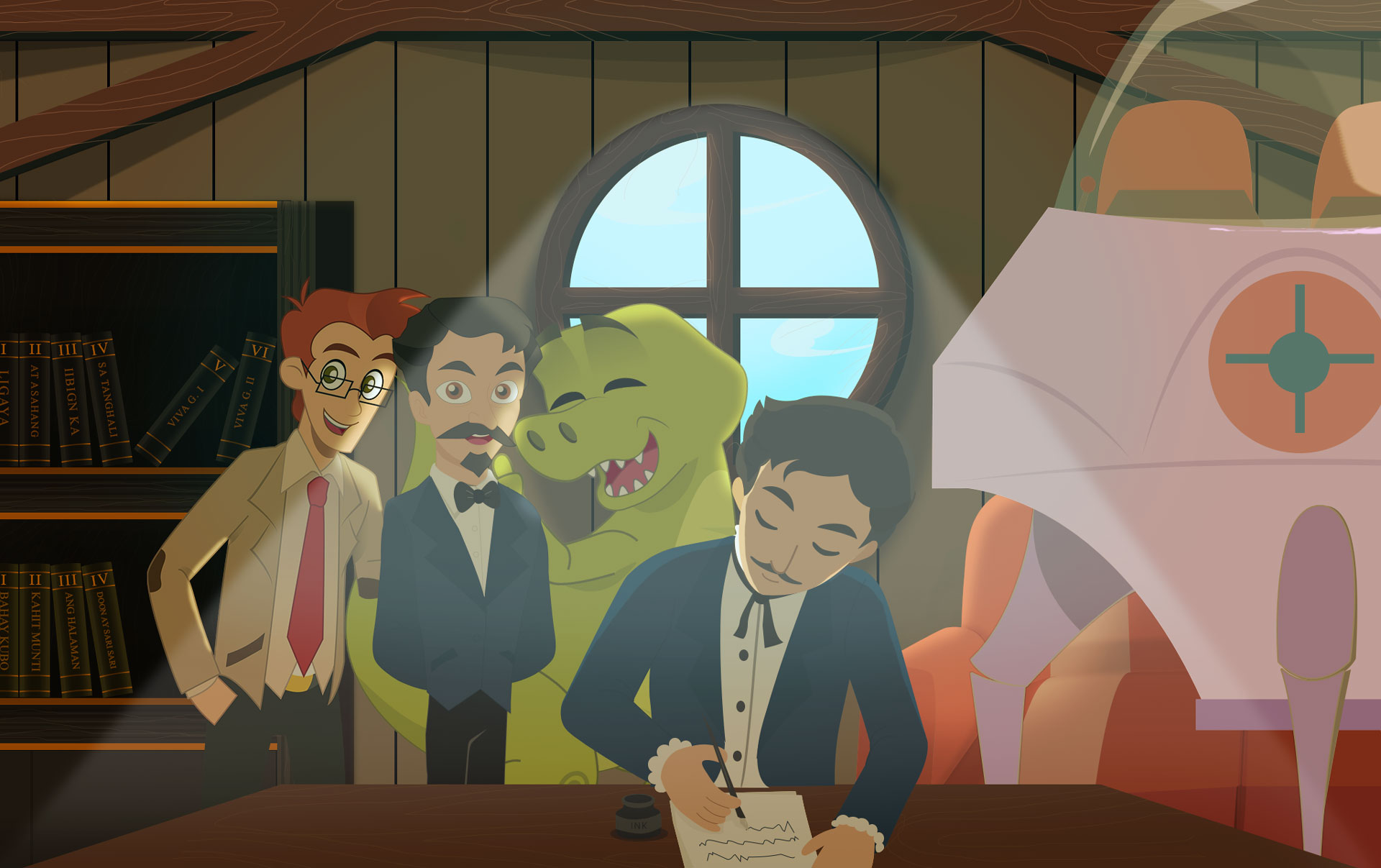What Does It Feel Like to Have HD?
November 22, 2021
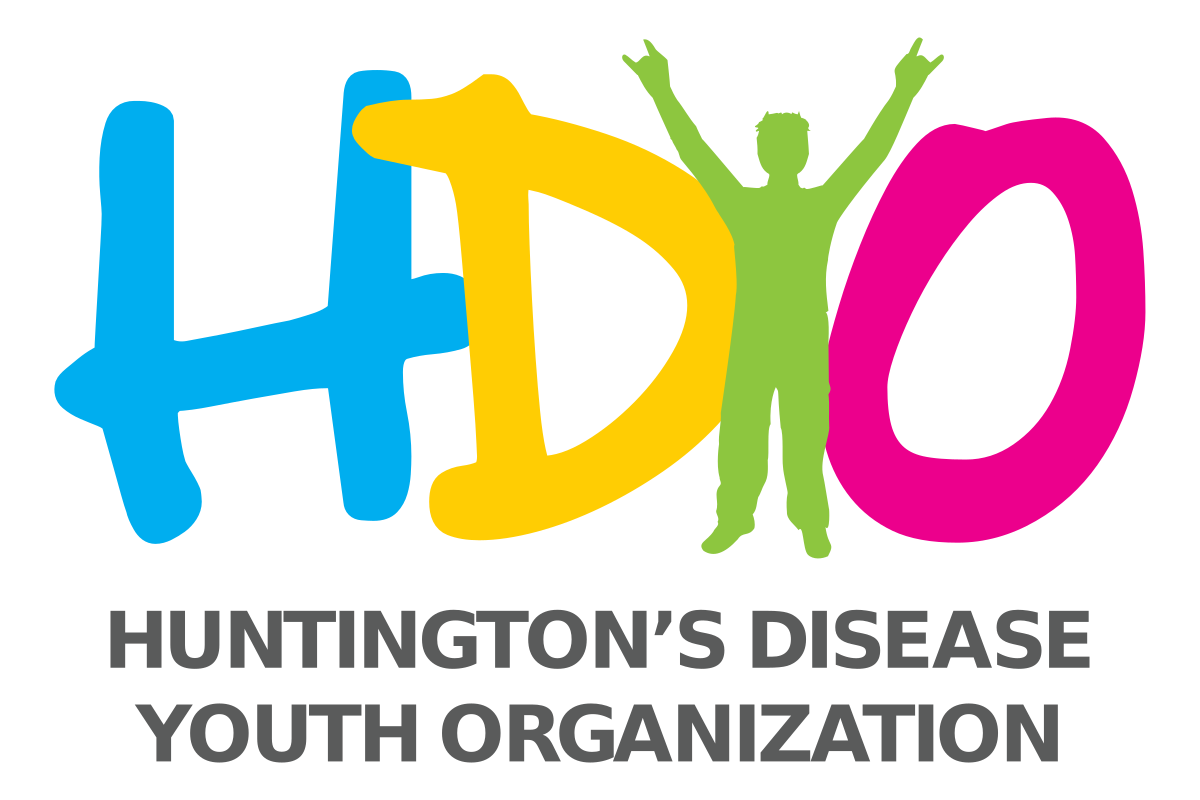
HDYO has more information about HD available for young people, parents and professionals on our site:
www.hdyo.org
Ever wondered what it might feel like to have Huntington's disease? This section is going to use a series of interactive exercises and games to provide you with an insight into the mind of a person who has Huntington's disease, and help you see the world through their eyes. HDYO would like to take the time to thank James Pollard for all his help with this section.
When a person has Huntington's disease many things are affected and, as a result, tasks become more difficult. To help us understand these changes and just how difficult tasks become for people, we are going to go through some of the changes individually and do various exercises to help us see how these changes feel to the person with the condition. Let's begin!
Slower thinking
The first change we are going to look at is how Huntington's disease causes people to process information more slowly than they used to. Everything seems to take longer when you have Huntington's disease, this is due to fewer cells in the brain working well together. It all leads to "slower thinking". But what does it feel like to do things slowly? Let's find out. You will need a pen and paper for this game. Now would be a good time to grab them.
The handwriting game
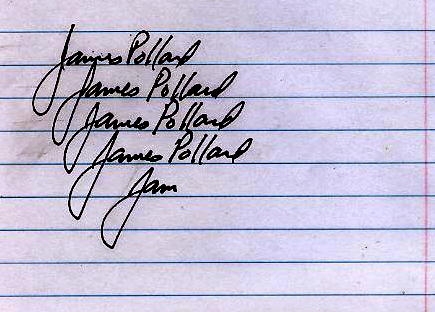
For this game we are going to look at the difference between how fast someone who doesn't have Huntington's disease can write compared to someone who does. During the game you will get to try and write at the speed of someone who has the condition and this will help you understand how people with Huntington's disease have to think very slowly and also how hard they have to concentrate when doing tasks. Ok, do you have your pen and paper?
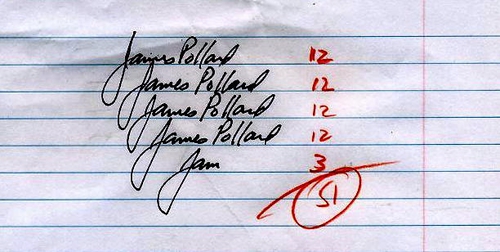
Firstly you are going to write your name on the piece of paper over and over again, for 15 seconds, at your own normal writing speed (just like James has in the image). Make sure you countdown the 15 seconds and stop writing once you reach 0. Ready? Go!
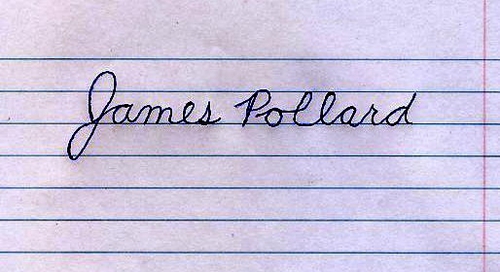
Ok, now we need to find out how many letters you wrote down in those 15 seconds. So count each letter and write down how many letters you managed to write (again, just like James has in the image). Once you've got your number, multiply it by 4 to find out what your letters per minute ratio is. For example, James wrote 51 letters in 15 seconds. If we multiply 51 by 4, we get 204, which gives us how many letters James could write in around one minute.
Do you have your number? Write it down so you will remember it.
Now we are going to slow things down. You are going to try and write your full name at the pace of only 1 letter every 10 seconds. You will need to count as you do each letter to make sure you don't go too fast. For instance, you will need to be half way through the first letter once you count to 5, and then complete the letter once you count to 10. Then repeat this for every letter until you have written your full name once (like James has in the image). Ready to try? Remember, 1 letter every 10 seconds, try to keep to the slow pace. Give it a try.
How was that for you? Slow? Tiring? Did you have to concentrate more and focus really hard on each letter? Was your handwriting worse?
This is what it can be like for someone with Huntington's disease - this is the speed that people with the condition process things in their mind. A person with mid-stage Huntington's disease is slower at processing things it takes them around a minute to write just 6 letters. That's one letter every 10 seconds - a huge difference compared to James who wrote down 204 letters in the same time limit.
It may take people with Huntington's disease a long time to do things. The point of this exercise is to highlight how important it is that we give people with Huntington's disease time to do things or respond to you and that we should not rush them. We will look into this further in the next section.
Answering questions with slower thinking
This "slower thinking" can lead to delays in processing information for people with Huntington's disease. These delays can be quite problematic, especially when trying to hold a conversation. You might have noticed with someone you know who has the condition that they may take a long time to answer any questions you ask. This may be because they are processing what you have asked them and are taking the time to think up a response. Just like the handwriting game, it takes people with Huntington's disease longer to do all of this than it normally would. As a result, it can take someone with Huntington's disease a lot longer to reply to a question than usual.
'I worked in a care home with some Huntington's disease patients and everyday I would walk in and say hi to all the patients. One by one these people would say hello back, apart from one woman who had Huntington's disease, she would never reply to me. I couldn't figure out why not! "Maybe she just didn't like me?" I thought to myself. So I told a member of staff that this woman never says hello to me, the staff member replied "that's odd, she always says hello to me, did you wait for her to reply?". And I realised that everytime I'd said hello to this woman, I was walking through and had never actually stopped and waited for a response. Could it be that simple?! The next day I gave it a try. I walked up to the woman and I said "hello", then I waited... and waited... and was about to leave, convinced that this was not working, when she suddenly said "Hi"! I couldn't believe it!' Jimmy Pollard
For some people with Huntington's disease, the delay in processing information will mean that it will take them longer to reply. Often, taking the time to wait for a response will result in a response. But make sure you don't ask too many questions at once, or interrupt someone before they have a chance to reply. Because by interrupting, you may 'reset the clock' and the person with the disease will have to start all over again and try to answer your latest question. For example, if you asked someone with Huntington's disease how they were, and didn't get a reply immediately, don't interrupt and say "did you hear me?", " I asked how you are?", because by asking another question or interrupting you will distract the person with Huntington's disease from thinking up an answer to your original question. The trick is to be patient and wait for a reply. This technique won't work with everybody, but for some it works fantastically well and can improve commication for both you and the person with Huntington's disease.
Memory: Recognition is easier than recall
People with Huntington's disease tend to struggle with their memory a lot, but not like those who have Alzheimers do. People with Alzheimers often find it hard to remember anything, whereas people with Huntington's disease can and do remember things, they just sometimes need a little bit of help to remember them. Now let's play another game!
The memory game

There are two ways to access your memory: recognition and recall. 'Recognition' is when the answer is there and you just need to recognise it. 'Recall' is when there is no answer in front of you and you have to use your memory to find the answer.
People with Huntington's disease struggle with recall, because it requires more concentration. To emphasise this point we are going to play a little game. Do you have your pen and paper? You are going to try and use recall to access your memory, in order to draw a coin. It doesn't matter what currency you use, just picture in your mind a coin in your currency. Don't go get the coin or look at it, even though you will need to find the coin afterwards so it would be wise to think of a coin that you know you have. For now, just think about what the coin looks like and draw from memory either the front or the back of that coin. Ready? Go.
Ok, now go and find an actual real-life version of the coin you were drawing. Let's see how close you were to remembering the coin correctly. Did you get it exactly right? Did you recall exactly how the coin looked from memory? It's not so easy is it... even though we use these coins all the time. You probably remembered roughly how the coin looks though, just not the exact details. However, someone with Huntington's disease would struggle to remember how that coin looks purely from memory because it involves using recall.
But people with Huntington's disease are much better at recognition. This is because recognition is easier than recall. Remember, 'recognition' is when the answer is there and you just have to recognise it. For example, if I asked you to tell me what the capital of Germany was? Would you know? Maybe not because you're having to recall it from memory. But if I asked you again and this time gave you some answers to pick from, would it help?
What is the capital of Germany?
- Hamburg
- Munich
- Berlin
- Dortmund
Were you able to select the right answer? Did having a choice of answers make it easier to recognise the correct one? This is known as recognition and people with Huntington's disease prefer it because it is easier than having to recall the answer without any help.
Let's face it, we all prefer multiple choice answers. For example, if we're doing an exam we always hope for multiple choice answers (or at least I do). It's easier for the brain to remember things when the answer is right there in front of you. So when talking to someone with Huntington's disease, try not to ask them a question that requires recall, try and ask them questions that they can use recognition with. For example, if you're selecting a film, instead of asking them "what film do you want to watch?" - which is a recall question, instead ask "what film do you want to watch, Batman or Lion King?". With that question you are providing choices, and allowing the person with Huntington's disease to recognise two choices and pick one.
The point is to try and make sure that you offer people with Huntington's disease choices when asking them questions. By doing this they are more likely to answer your question (but make sure you remember to wait for a reply if necessary too).
Keeping focus is more difficult
Having to divide attention or do two things at once becomes difficult for someone who has Huntington's disease. As a result they usually prefer to direct all their attention and focus on to one thing at a time. So when asked to multitask, people with the condition may struggle to keep their focus. To get an idea of what it is like to focus on two things at once we are going to play a game which is often done as an exercise in Huntington's disease research studies. It is known as the 'Stroop task', after the man who invented it. But HDYO prefers to call it the colour game.
The colour game
Firstly we are going to focus on one thing, which is generally easier for us all. So in the first round of this game all you need to do is say the colours of the words as fast as you can. For example, your first three would be "red, green, blue...". Give it a try.
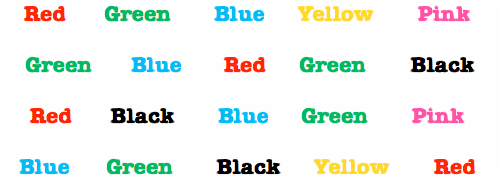
How was that for you? Fairly easy? That was just a warm-up. This time you will have to focus on two different things at the same time. This will help give you some idea of what it is like for someone with Huntington's disease when they are asked to multitask and just how confusing it can become. In this round you need to say what colour each word is... not what colour the word says. For example, for the first 'Red' you would say "blue", because that's what colour it is. Do you understand? Keep on going until you get one wrong, see how far you can get. If you complete it, start from the top again and carry on. Ready? Go!
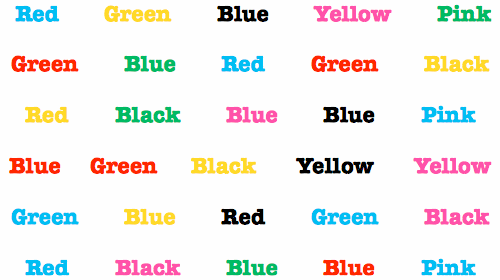
How did you do? It's difficult isn't it? Having to focus on two different things at the same time and then to ignore one while focusing completely on the other. It's very confusing and people with Huntington's disease struggle to ignore one and focus on the other like this. Which is why multitasking becomes difficult for people with Huntington's disease. A good example of this type of confusion is when people with Huntington's disease try to hold a conversation while there is music in the background. Many may find this kind of multitasking difficult and struggle to concentrate on both.
Difficulty organising, planning and sequencing
People with Huntington's disease tend to have difficulty organising, planning and sequencing their thoughts and actions. It's not that they can't do things, it's just that they require a lot more concentration and effort than before. To demonstrate this we are going to do a couple of exercises, the first of which is to highlight the concentration needed to move from A to B when you have the disease.
The blindfold game

Ok, to play the blindfold game we need to set down some safety rules. Firstly, find yourself a nice big room (maybe even a garden), that will be big and safe enough to walk around blindfolded. Secondly, get an object (it can be any object) and put it at the far end of the room/space you are in. Thirdly, find yourself a blindfold, if you don't have one you can simply close your eyes (but don't cheat!).
Once you've done all of this, we can start safely. The aim of the game is simple. Blindfolded, you must get from one end of the room to the object at the other end of the room. Only, before you start, you are going to spin yourself (or have someone else spin you) around a few times until you are unsure which direction you are facing. Then you may try and get to your object. Remember, be safe, HDYO can't afford a law suit if you injure yourself. Ready? Go...
How did you do? Not easy is it. So, what was the point of this exercise? Well we know that Huntington's disease does not cause a loss of vision, but this exercise was to show how the symptoms of Huntington's disease make walking from A to B a lot more difficult, and something which requires a high-level of concentration. You had to think really hard to try and figure out where you were exactly in the room/space, just like someone with Huntington's disease has to concentrate hard to walk from A to B.
Planning movements is difficult for someone with Huntington's disease, but it's also difficult to organise and sequence your thoughts.
The counting game
We're going to do a very simple counting exercise to highlight how much concentration people with Huntington's disease have to use in order to organise and plan things. All you need for this game is your brain. Found it? Ok, let's continue. We are going to count backwards from 100 in sequences of 7. For example, you will start with 100, then it would be 93, 86... etc. See how long it takes you to complete the countdown. Ready? Go
How did you get on? This game required a lot of concentration too, just like most of the games in this section have. This is what it is like for those that have Huntington's disease, they have to concentrate a lot more on everything they do. Things that used to be done automatically, without having to think, now require a huge amount of concentration and effort for the person.
Beginning to understand how it might feel...
When you put all these games, exercises and points together you can begin to see what it might feel like to have Huntington's disease. You can begin to realise that Huntington's disease can make tasks very challenging and we can begin to understand the levels of concentration needed to achieve things that were once done automatically, without even thinking. You can also start to understand how people with the disease might feel a little bit tired after a walk, or might not respond to a question straight away, or might want to focus on only one thing at a time. By understanding better what it feels like to have the disease, we can be more understanding of those that have it.
We hope you have enjoyed this section. If you have any questions about anything you have read then you can ask our experts by emailing HDYO's Ask a question service.



